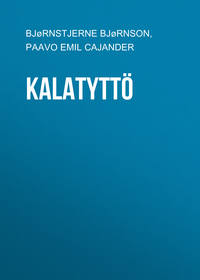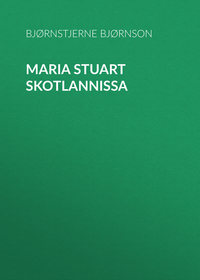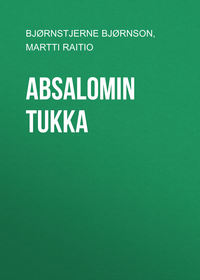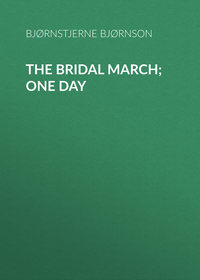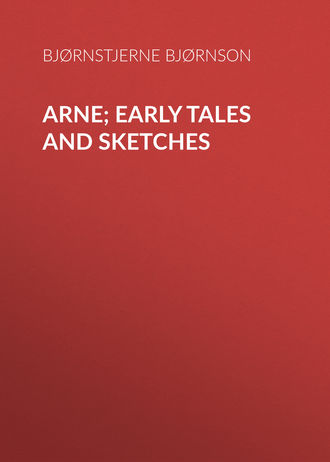 полная версия
полная версияArne; Early Tales and Sketches
"Arne, Arne, are you here? So I have really found you. I have been looking for you since yesterday; I have searched the whole night! Poor, poor Arne! I saw they had wounded you. I wanted so much to talk with you and comfort you; but then I never dare talk with you! Arne, I saw you drink! O God Almighty! let me never see it again!"
It was long before she could say more. "Jesus have mercy on you, my child; I saw you drink! Suddenly you were gone, drunk and crushed with grief as you were, and I ran around to all the houses. I went far out in the field; I did not find you. I searched in every copse; I asked every one. I was here, too, but you did not answer me – Arne, Arne! I walked along the river; but it did not seem to be deep enough anywhere" – She pressed up close to him. "Then it came with such relief to my mind that you might have gone home, and I am sure I was not more than a quarter of an hour getting over the road. I opened the door and looked in every room, and then first remembered that I myself had the key; you could not possibly have entered. Arne, last night I searched along the road on both sides; I dared not go to the Kamp gorge. I know not how I came here; no one helped me; but the Lord put it into my heart that you must be here!"
He tried to soothe her.
"Arne, indeed, you must never drink brandy again."
"No, you may be sure of that."
"They must have been very rough with you. Were they rough with you?"
"Oh, no; it was I who was cowardly." He laid stress on the word.
"I cannot exactly understand why they should be rough with you. What was it they did to you? You will never tell me anything," and she began to weep again.
"You never tell me anything, either," said Arne, gently.
"But you are most to blame, Arne. I got so into the habit of being silent in your father's day that you ought to have helped me a little on the way! My God! there are only two of us, and we have suffered so much together!"
"Let us see if we cannot do better," whispered Arne. "Next Sunday I will read the sermon to you."
"God bless you for that! Arne?"
"Yes?"
"I have something I ought to say to you."
"Say it, mother."
"I have sinned greatly against you; I have done something wrong."
"You, mother?" And it touched him so deeply that his own good, infinitely patient mother should accuse herself of having sinned against him, who had never been really good to her, that he put his arm round her, patted her, and burst into tears.
"Yes, I have; and yet I could not help it."
"Oh, you have never wronged me in any way."
"Yes, I have, – God knows it; it was only because I was so fond of you. But you must forgive me; do you hear?"
"Yes, I will forgive you."
"Well, then, I will tell you about it another time; but you will forgive me?"
"Oh, yes, mother!"
"You see, it is perhaps because of this that it has been so hard to talk with you; I have sinned against you."
"I beg of you not to talk so, mother."
"I am happy now, having been able to say so much."
"We must talk more together, we two, mother."
"Yes, that we must; and then you will really read the sermon for me?"
"Yes, I will do so."
"Poor Arne! God bless you!"
"I think it is best for us to go home."
"Yes, we will go home."
"Why are you looking round so, mother?"
"Your father lay in this barn, and wept."
"Father?" said Arne, and grew very pale.
"Poor Nils! It was the day you were christened. Why are you looking round, Arne?"
CHAPTER VIII
From the day that Arne tried with his whole heart to live closer to his mother his relations with other people were entirely changed. He looked on them more with the mother's mild eyes. But he often found it hard to keep true to his resolve; for what he thought most deeply about his mother did not always understand. Here is a song from those days: —
"It was such a pleasant, sunny day,In-doors I could not think of staying:I strolled to the wood, on my back I lay,And rocked what my mind was saying;But there crawled emmets, and gnats stung there,The wasps and the clegs brought dire despair."'My dear, will you not go out in this pleasant weather?' said mother. She sat singing on the porch.
"It was such a pleasant, sunny day,In-doors I could not think of staying:I strayed to a field, on my back I lay,And sang what my mind was saying;But snakes came out to enjoy the sun,Three ells were they long, and away I run."'In such pleasant weather we can go barefoot,' said mother, and she pulled off her stockings.
"It was such a pleasant, sunny day,In-doors I could no longer tarry:I stepped in a boat, on my back I lay,The tide did me onward carry;The sun, though, scorched till my nose was burned;There's limit to all, so to shore I turned."'What fine days these are for drying the hay!' said mother, as she shook it with a rake.
"It was such a pleasant, sunny day,In-doors I could not think of staying:I climbed up a tree, and thought there I'd stay,For there were cool breezes playing.A grub to fall on my neck then there chanced;I sprang down and screamed, and how madly I danced."'Well, if the cow does not thrive such a day as this, she never will,' said mother, as she gazed up the slope.
"It was such a pleasant, sunny day,In-doors I could no peace discover:I made for the force that did loudly play,For there it must surely hover;But there I drowned while the sun still shone.If you made this song, it is surely not my own.17"'It would take only about three such sunny days to get everything under cover,' said mother; and off she started to make my bed."
Nevertheless, this companionship with his mother brought every day more and more comfort to Arne. What she did not understand formed quite as much of a tie between them as what she did understand. For the fact of her not comprehending a thing made him think it over oftener, and she grew only the dearer to him because he found her limits on every side. Yes, she became infinitely dear to him.
As a child, Arne had not cared much for nursery stories. Now, as a grown person, he longed for them, and they led to traditions and ancient ballads. His mind was filled with a wonderful yearning; he walked much alone, and many of the places round about, which formerly he had not noticed, seemed strangely beautiful. In the days when he had gone with those of his own age to the priest's to prepare for confirmation, he had often played with them by a large lake below the parsonage, called Black Water, because it was deep and black. He began to think of this lake now, and one evening he wended his way thither.
He sat down behind a copse, just at the foot of the parsonage. This lay on the side of a very steep hill, which towered up beyond until it became a high mountain; the opposite bank was similar, and therefore huge shadows were cast over the lake from both sides, but in its centre was a stripe of beautiful silvery water. All was at rest; the sun was just setting; a faint sound of tinkling bells floated over from the opposite shore; otherwise profound silence reigned. Arne did not look right across the lake, but first turned his eyes toward its lower end, for there the sun was shedding a sprinkling of burning red, ere it departed. Down there the mountains had parted to make room between them for a long, low valley, and against this the waves dashed; and it seemed as though the mountains had gradually sloped together to form a swing in which to rock this valley, which was dotted with its many gards. The curling smoke rose upward, and passed from sight; the fields were green and reeking; boats laden with hay were approaching the landings. Arne saw many people passing to and fro, but could hear no noise. Thence the eye wandered beyond the shore, where God's dark forest alone loomed up. Through the forest and along the lake men had drawn a road, as it were, with a finger, for a winding streak of dust plainly marked its course. This Arne's eye followed until it came directly opposite to where he was sitting; there the forest ended; the mountains made a little more room, and straightways gard after gard lay spread about. The houses were still larger than those at the lower end, were painted red, and had higher windows, which now were in a blaze of light. The hills sparkled in dazzling sunshine; the smallest child playing about could be plainly seen; glittering white sand lay dry on the shore, and upon this little children bounded with their dogs. But suddenly the whole scene became desolate and gloomy; the houses dark red, the meadows dingy green, the sand grayish-white, and the children small clumps: a mass of mist had risen above the mountains, and had shut out the sun. Arne kept his eye fixed on the lake; there he found everything again. The fields were rocking there, and the forest silently joined them; the houses stood looking down, doors open, and children going out and in. Nursery tales and childish things came thronging into his mind, as little fish come after a bait, swim away, come back again, but do not nibble.
"Let us sit down here until your mother comes; the priest's lady will surely get through some time."
Arne was startled; some one had sat down just behind him.
"But I might be allowed to stay just this one night," said a beseeching voice, choked with tears; it seemed to be that of a young girl, not quite grown up.
"Do not cry any more; it is shocking to cry because you must go home to your mother." This last came in a mild voice that spoke slowly and belonged to a man.
"That is not the reason I am crying."
"Why are you crying, then?"
"Because I shall no longer be with Mathilde."
This was the name of the priest's only daughter, and reminded Arne that a peasant girl had been brought up with her.
"That could not last forever, any way."
"Yes, but just one day longer, dear!" and she sobbed violently.
"It is best you should go home at once; perhaps it is already too late."
"Too late? Why so? Who ever heard of such a thing?"
"You are peasant-born, and a peasant you shall remain: we cannot afford to keep a fine lady."
"I should still be a peasant, even if I remained here."
"You are no judge of that."
"I have always worn peasant's clothes."
"It is not that which makes the difference."
"I have been spinning and weaving and cooking."
"It is not that, either."
"I can talk just as you and mother do."
"Not that, either."
"Then I do not know what it can be," said the girl, and laughed.
"Time will show. Besides, I am afraid you already have too many ideas."
"Ideas, ideas! You are always saying that. I have no ideas." She wept again.
"Oh, you are a weathercock, – that you are!"
"The priest never said so."
"No, but now I say so."
"A weathercock? Who ever heard of such a thing? I will not be a weathercock."
"Come, then, what will you be?"
"What will I be? Did you ever hear the like? I will be nothing."
"Very good, then; be nothing."
Now the girl laughed. Presently she said, gravely, "It is unkind of you to say I am nothing."
"Dear me, when that was what you wanted to be yourself!"
"No, I do not want to be nothing."
"Very good, then; be everything."
The girl laughed. Presently, with a sorrowful voice, "The priest never fooled with me in this way."
"No, he only made a fool of you."
"The priest? You have never been so kind to me as the priest has."
"No, for that would have spoiled you."
"Sour milk can never become sweet."
"Oh, yes, when it is boiled to whey."
Here the girl burst out laughing.
"There comes your mother."
Then she grew sober again.
"Such a long-winded woman as the priest's lady I have never met in all the days of my life," here interposed a shrill, rattling voice. "Make haste, now, Baard. Get up and push the boat out. We will not get home to-night. The lady wished me to see that Eli kept her feet dry. Dear me, you will have to see to that yourself. Every morning she must take a walk, for the sake of her health. It is health, health, from morning till night. Get up, now, Baard, and push out the boat. Just think, I have to set sponge this evening!"
"The chest has not come yet," said he, and lay still.
"But the chest is not to come, either; it is to remain until the first Sunday there is service. Do you hear, Eli? Pick yourself up; take your bundle, and come. Get up, now, Baard!"
She led the way, and the girl followed.
"Come, now, I say, – come now!" resounded from below.
"Have you looked after the plug in the boat?" asked Baard, still without rising.
"Yes, it is there;" and Arne heard her just then hammering it in with the scoop. "But get up, I say, Baard! Surely we are not to stay here all night?"
"I am waiting for the chest."
"But, my dear, bless you, I have told you it is to wait until the first Sunday there is service."
"There it comes," said Baard, and they heard the rattling of a cart.
"Why, I said it was to wait until the first Sunday there is service."
"I said we were to take it along."
Without anything further, the wife hastened up to the cart, and carried the bundle, the lunch-box, and other small things down to the boat. Then Baard arose, went up, and took the chest himself.
But behind the cart there came rushing along a girl in a straw hat, with floating hair; it was the priest's daughter.
"Eli! Eli!" she called, as she ran.
"Mathilde! Mathilde!" Eli answered, and ran toward her.
They met on the hill, put their arms about each other, and wept. Then Mathilde took up something she had set down on the grass: it was a bird-cage.
"You shall have Narrifas; yes, you shall. Mother wishes it, too. You shall, after all, have Narrifas, – indeed, you shall; and then you will think of me. And very often row – row – row over to me," and the tears of both flowed freely.
"Eli! Come, now, Eli! Do not stand there!" was heard from below.
"But I want to go along," said Mathilde. "I want to go and sleep with you to-night!"
"Yes, yes, yes!" and with arms twined about each other's necks they moved down toward the landing.
Presently Arne saw the boat out on the water. Eli stood high on the stern, with the bird-cage, and waved her hand; Mathilde was left behind, and sat on the stone landing weeping.
She remained sitting there as long as the boat was on the water; it was but a short distance across to the red house, as said before; and Arne kept his seat, too. He watched the boat, as she did. It soon passed into the darkness, and he waited until it drew up to the shore: then he saw Eli and her parents in the water; in it he followed them up toward the houses, until they came to the prettiest one of them all. He saw the mother go in first, then the father with the chest, and last of all the daughter, so far as he could judge from their size. Soon after the daughter came out again, and sat down in front of the store-house door, probably that she might gaze over at the other side, where at that moment the sun was shedding its parting rays. But the young lady from the parsonage had already gone, and Arne alone sat watching Eli in the water.
"I wonder if she sees me!"
He got up and moved away. The sun had set, but the sky was bright and clear blue, as it often is of a summer night. Mist from land and water rose and floated over the mountains on both sides; but the peaks held themselves above it, and stood peering at one another. He went higher up. The lake grew blacker and deeper, and seemed, as it were, to contract. The upper valley shortened, and drew closer to the lake. The mountains were nearer to the eye, but looked more like a shapeless mass, for the light of the sun defines. The sky itself appeared nearer, and all surrounding objects became friendly and familiar.
CHAPTER IX
Love and woman were beginning to play a prominent part in his thoughts; in the ancient ballads and stories of the olden times such themes were reflected as in a magic mirror, just as the girl had been in the lake. He constantly brooded over them, and after that evening he found pleasure in singing about them; for they seemed, as it were, to have come nearer home to him. But the thought glided away, and floated back again with a song that was unknown to him; he felt as though another had made it for him, —
"Fair Venevill bounded on lithesome feetHer lover to meet.He sang till it sounded afar away,'Good-day, good-day,'While blithesome birds were singing on every blooming spray'On Midsummer DayThere is dancing and play;But now I know not whether she weaves her wreath or nay.'"She wove him a wreath of corn-flowers blue:'Mine eyes so true.'He took it, but soon away it was flung:'Farewell!' he sung;And still with merry singing across the fields he sprung'On Midsummer Day,' etc."She wove him a chain. 'Oh, keep it with care!'T is made of my hair.'She yielded him then, in an hour of bliss,Her pure first kiss;But he blushed as deeply as she the while her lips met his.'On Midsummer Day,' etc."She wove him a wreath with a lily-band:'My true right hand.'She wove him another with roses aglow:'My left hand, now.'He took them gently from her, but blushes dyed his brow'On Midsummer Day,' etc."She wove him a wreath of all flowers round:'All I have found.'She wept, but she gathered and wove on still:'Take all you will.'Without a word he took it, and fled across the hill.'On Midsummer Day,' etc."She wove on, bewildered and out of breath:'My bridal wreath.'She wove till her fingers aweary had grown:'Now put it on.'But when she turned to see him, she found that he had gone.'On Midsummer Day,' etc."She wove on in haste, as for life and death,Her bridal wreath;But the Midsummer sun no longer shone,And the flowers were gone;But though she had no flowers, wild fancy still wove on.'On Midsummer-DayThere is dancing and play;But now I know not whether she weaves her wreath or nay."18It was his own intense melancholy that called forth the first image of love that glided so gloomily through his soul. A twofold longing, – to have some one to love and to become something great, – blended together and became one. At this time he was working again at the song, "Over the lofty mountains," altering it, and all the while singing and thinking quietly to himself, "Surely I will get 'over' some day; I will sing until I gain courage." He did not forget his mother in these his thoughts of roving; indeed, he took comfort in the thought that as soon as he got firm foothold in the strange land, he would come back after her, and offer her conditions which he never could be able to provide for her at home. But in the midst of all these mighty yearnings there played something calm, cheering, refined, that darted away and came again, took hold and fled, and, dreamer that he had become, he was more in the power of these spontaneous thoughts than he himself was aware.
There lived in the parish a jovial man whose name was Ejnar Aasen. When he was twenty years old he had broken his leg; since then he had walked with a cane; but wherever he came hobbling along, there was always mirth afoot. The man was rich. On his property there was a large nut-wood, and there was sure to be assembled, on one of the brightest, pleasantest days in autumn, a group of merry girls gathering nuts. At these nutting-parties he had plenty of feasting for his guests all day, and dancing in the evening. For most of these girls he had been godfather; indeed, he was the godfather of half the parish; all the children called him godfather, and from them every one else, both old and young, learned to do so.
Godfather and Arne were well acquainted, and he liked the young man because of the verses he made. Now godfather asked Arne to come to the nutting-party. Arne blushed and declined; he was not used to being with girls, he said.
"Then you must get used to it," replied godfather.
Arne could not sleep at night because of this; fear and yearning were at war within him; but whatever the result might be, he went along, and was about the only youth among all these girls. He could not deny that he felt disappointed; they were neither those he had sung about, nor those he had feared to meet. There was an excitement and merriment, the like of which he had never known before, and the first thing that struck him was that they could laugh over nothing in the world; and if three laughed, why, then, five laughed, simply because those three laughed. They all acted as though they were members of the same household; and yet many of them had not met before that day. If they caught the bough they were jumping after, they laughed at that, and if they did not catch it, they laughed at that, too. They fought for the hook to draw it down with; those who got it laughed, and those who did not get it, laughed also. Godfather hobbled after them with his cane, and offered all the hindrance in his power. Those whom he caught laughed because he caught them, and those whom he did not catch laughed because he did not catch them. But they all laughed at Arne for being sober, and when he tried to laugh, they laughed, because he was laughing at last.
They seated themselves finally on a large hill, godfather in the centre, and all the girls around him. The hill commanded a fine outlook; the sun scorched; but the girls heeded it not, they sat, casting nut-husks and shells at one another, giving the kernels to godfather. He tried to quiet them at last, striking at them with his cane, as far as he could reach; for now he wanted them to tell stories, above all, something amusing. But to get them started seemed more difficult than to stop a carriage on a hill-side. Godfather began himself. There were many who did not want to listen; for they knew already everything he had to tell; but they all ended by listening attentively. Before they knew what they were about, they sat in the centre, and each took her turn in following his example as best she could. Now Arne was much astonished to find that just in proportion to the noise the girls had made before was the gravity of the stories they now told. Love was the chief theme of these.
"But you, Aasa, have a good one; I remember that from last year," said godfather, turning to a plump girl with a round, pleasant face, who sat braiding the hair of a younger sister, whose head was in her lap.
"Several that are here may know that," said she.
"Well, give it to us anyway," they begged.
"I will not have to be urged long," said she, and, still braiding, she told and sang, as follows: —
"There was a grown-up youth who tended cattle, and he was in the habit of driving his herds upward, along the banks of a broad stream. High up on his way, there was a crag which hung out so far over the stream, that when he stood on it he could call out to any one on the other side. For on the other side of the stream there was a herd-girl whom he could see all day long, but he could not come over to her.
'Now, tell me thy name, thou girl that art sitting,Up there with thy sheep, so busily knitting?'he asked, over and over again, for many days, until at last one day there came the answer, —
'My name floats about like a duck in wet weather; —Come over, thou boy in the cap of brown leather.'"But this made the youth no wiser than before, and he thought he would pay no further heed to the girl. This was not so easy, though, for, let him drive the cattle where he would, he was always drawn back to the crag. Then the youth grew alarmed, and called over: —
'Well, who is your father, and where are you biding?On the road to the church I have ne'er seen you riding.'"The youth more than half believed her, in fact, to be a hulder.19
'My house is burned down, and my father is drowned,And the road to the church-hill I never have found.'"Now this also made the youth no wiser than before. By day he lingered on the crag, and by night he dreamed that she was dancing around him, and gave him a lash with a great cow's-tail each time he tried to take hold of her. Soon he could not sleep at all, neither could he work, and the poor youth was in a wretched state. Again he called aloud, —
'If thou art a hulder, then pray do not spell me, —If thou art a maiden, then hasten to tell me?'"But there came no answer, and then he was sure that this was a hulder. He gave up tending cattle, but it was just as bad, for wherever he went, or whatever he did, he thought of the fair hulder who blew on the horn.




